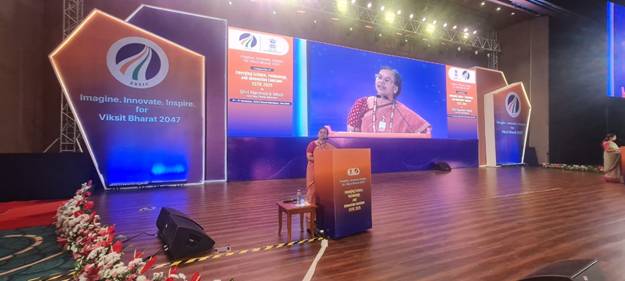The Council of Scientific and Industrial Research (CSIR) hosted impactful technical session on Day 3 of the Empowering Science, Technology and Innovation Conclave (ESTIC) 2025, highlighting India’s advancements in Advanced Materials & Manufacturing. The session brought together leading scientists, innovators, and entrepreneurs to discuss transformative technologies shaping the nation’s innovation ecosystem.
The Advanced Materials & Manufacturing plenary session, chaired by Dr. (Mrs) N. Kalaiselvi, Director General, CSIR and Secretary, DSIR, featured a diverse range of discussions on how advanced materials are redefining product realization, industrial design, and sustainability.
Speaking at the plenary, Dr. (Mrs) N. Kalaiselvi, Director General, CSIR, emphasized that science, research and development, and advanced materials are the key pillars for Viksit Bharat 2047. She underlined that breakthroughs in materials science, clean energy, biotechnology, and emerging technologies will shape the country’s growth trajectory. With CSIR and India’s premier scientific institutions leading cutting-edge research, India is laying the foundation for a technologically empowered, self-reliant, and innovation-driven future.
Dr. Kalaiselvi added that ESTIC 2025 serves as an impactful platform where ideas, science, and advanced technologies intersect—accelerating the realization of a future-ready and knowledge-powered Bharat.
Delivering the keynote address, Prof. Giridhar Udapi Rao Kulkarni, Former President, JNCASR, Bengaluru, explained how the world is moving from matter to materials — from raw elements to engineered structures designed with precision, performance, and purpose. From semiconductors and composites to smart polymers, he illustrated how advanced materials are unlocking next-generation technologies and real-world products, powering India’s transformation from a Stone Age mindset to the Age of Technology. He emphasized that with nano-scale precision, shape control, and dimensional engineering, scientific innovation can drive manufacturing breakthroughs that accelerate India’s vision for Viksit Bharat 2047, encapsulated in the continuum: Science → Innovation → Manufacturing → Product.
The session featured insightful presentations by leading innovators and entrepreneurs. Shri Pawan Kumar Chandana, Co-founder and CEO, Skyroot Aerospace, Hyderabad, spoke on “Elevating Aerospace: The Frontier of Advanced Composites and 3D Printing”, underlining indigenous innovation driving India’s private space sector. He mentioned that Skyroot Aerospace is developing India’s first all-carbon launch vehicle, Vikram-1
Smt. Rajashri Teli, Managing Director, Innovative Projects Pvt. Ltd., Pimpri, presented “From Blueprint to Breakthrough: When Precision Becomes a National Duty”, highlighting the importance of design accuracy and women-led leadership in manufacturing.
Prof. T. Pradeep, IIT Madras, Chennai, discussed “Matter Dreams at Scale: Creating the Future of Materials”, focused on scalable nanotechnologies for clean water and sustainable solutions.
The innovation leadership talks Prof. B. S. Murty, Raman Research Institute, Bengaluru, focused on “Building India’s Quantum Edge”, showcasing advances in semiconductor design, photonics, and quantum computing.
The successful concluding session reaffirmed CSIR’s unwavering commitment to advancing India’s scientific and technological frontiers. The exchange of ideas, insights, and innovations at the conclave demonstrates how collaborative efforts between researchers, industry leaders, and policymakers are accelerating the nation’s transition to a knowledge-driven economy. As India charts its path toward Viksit Bharat 2047, the applied research in advanced materials and manufacturing showcased here will be pivotal in fostering self-reliance, sustainable growth, and global competitiveness. Participants departed with a renewed sense of purpose to continue driving breakthroughs that will shape India’s future as a global innovation powerhouse.

*****





